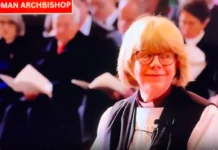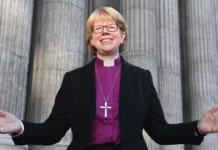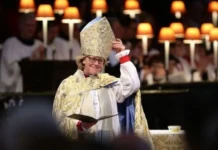I received the following comment on my Contending Anglican blog from a clergyman in the Church of England with regard to my post on Jerusalem Declaration clause 13. I am posting his comment and my reply with his permission. NOTE: He suggested that I highlight the distinction between spiritual and temporal authority, which I have done below (in bold). This distinction is my interpretation of the intent of clause 13, though it is not the literal wording, and I certainly do not see it as a “free pass” out of difficult decisions such as the one highlighted (in italics) in the paragraph that follows.
***
He writes:
As a recently-ordained theologically-conservative minister in the Church of England who has not yet signed the Jerusalem Declaration, I struggle to understand what a commitment to Clause 13 would mean in practice.
I serve under the authority of my (orthodox) diocesan bishop. So Clause 13 does not require me to reject his authority.
But if I find myself serving under another bishop, who is deemed (by whom?) to “have denied the orthodox faith in word or deed”, then what next? According to Clause 13, I would have declared that I will “reject the authority” of that bishop.
This, it seems, means I would need to resign from my position at that point. I cannot serve under the authority of a bishop while “rejecting the authority” of the same.
I am not prepared to make such a commitment, for three reasons.
First, the bishop’s authority is temporary. No bishop is eternal. There is no “need” for immediate visible differentiation; waiting patiently for God to intervene is always an option.
Second, the bishop’s authority is not absolute. I have taken an oath of canonical obedience to my bishop. This means I pledge to obey my bishop insofar as he or she instructs me to obey the canons of the church. If the canons of the church are orthodox, then I am not obliged to obey my bishop if he or she instructs me to depart from orthodoxy.
Third, bishops in the Church of England are themselves bound by solemn declarations. If my bishop departs from orthodoxy, then he or she would be breaching the declarations made at their ordinations/consecration. I can therefore reject their moral authority if they act with such a lack of integrity, but this does not require me to reject their authority in the kind of absolute sense implied by Clause 13.
Now, perhaps this is not what “reject the authority” means in Clause 13. If so, then it could at least be clarified.
I hope that helps to clarity. Thank you again for the posts.
***
Here is my reply to this comment:
Thank you so much for your thoughtful comment to my posting concerning the Jerusalem Declaration, clause 13, which states: “We reject the authority of those churches and leaders who have denied the orthodox faith in word or deed. We pray for them and call on them to repent and return to the Lord.”
You state: “As a recently-ordained theologically-conservative minister in the Church of England who has not yet signed the Jerusalem Declaration, I struggle to understand what a commitment to Clause 13 would mean in practice.”
Let me begin with some general observations based on the two-decades long process of “realignment” of North American Anglicans (I fear that many in the Church of England are myopic concerning a similar realignment that is underway in the UK and the wider Communion).
- The decision to “reject the authority” of one’s bishop or one’s church is a matter of conscience, i.e., conscience informed by biblical and spiritual discernment.
- Discernment usually takes time. Just as one should not lightly seek ordination, so also one should not lightly reject the authority of churches and leaders.
- Such a decision may or may not lead one to leave or be expelled from the church, but one needs to count the cost in making any decision. Staying in a corrupt and dying church may be as “risky” as pioneering a new church.
Clause 13, as I see it, is directed first and foremost to bishops, who in our tradition are the chief shepherds of the flock and defenders of the faith. Shortly after Lambeth 1998 and the rejection of Resolution I.10 in the Episcopal Church, I wrote a piece called “Broken Communion: The Ultimate Sanction Against False Religion and Morality in the Episcopal Church.” It was addressed to orthodox bishops in TEC, arguing that the conscientious way they could respond to heretical bishops without leaving the church was to declare themselves in a state of “broken communion.” None did. No doubt they would have been defrocked if they had.
While I am sure that there is a variety of ways of applying Clause 13, I imagine it in terms of refusing table fellowship, specifically of not sharing Holy Communion and of not “taking counsel together” in formal church assemblies. This has been the position taken by many Gafcon bishops in refusing to share Communion at post-1998 Primates’ Meetings and to attend the Lambeth Conferences in 2008 and 2020.
What about priests (presbyters)? As you point out, priests vow to “obey” (1662 BCP) or “give due respect to” (Common Worship) their bishop and other authorities. That raises the question of when, if ever, a priest is right to “reject the authority” of his bishop. I would point to two places in these Ordinals which would justify conscientious disobedience.
In the 1662 Ordinal, following the powerful exhortation to shepherd the flock of Christ and before the vow to obey the bishop, the priest makes two other vows:
- to minister the doctrine and Sacraments, and the discipline of Christ, as the Lord hath commanded, and as this Church, and Realm hath received the same…; and
- to banish and drive away all erroneous and strange doctrines contrary to God’s Word.
Common Worship has weakened these vows but still mentions doctrine explicitly and discipline implicitly “as this church has received it.” This last phrase in the American Prayer Book led clergy in the Episcopal Church to declare that in a conflict of authority, the priest’s “first promise” to the historic teaching and practice of the church takes precedence over the false teaching and practice of any bishop or church assembly (cf. Article XX). It is hard to see how the Reformation could have happened without this conviction.
A priest is a “man under authority,” but he is also entrusted with the direct pastoral oversight of his parish. So long as he remains in the Church, he owes canonical obedience in the many “temporal” affairs of church life, but he may also be obliged to draw the line in spiritual matters and confess with the apostles: “We must obey God and not men.” It may not be easy to discern the magic line where temporal and spiritual authority diverge, but surely there is such a line.
In this regard, I would find it difficult as a pastor to abide by the 2014 “Pastoral Guidance on Same Sex Marriage” (§§15-18) which states that same-sex partners, whether married or in civil partnerships, should not be refused the sacraments. How is it possible to exercise pastoral care of souls whose public (a.k.a. “notorious”) manner of life puts their salvation at risk (1 Cor 6:9-10)? Would your orthodox bishop stand with you if you were to warn and turn away married same-sex couples from the Communion table, saying: “I choose to follow Scripture (Matt 18:15-18) and the Book of Common Prayer”? If he would not, as I see it, you would be free, even obliged, to reject his authority for the sake of the integrity of Christ’s flock and for the souls of those for whom Christ died.
A final difficult discernment – and I can imagine this is particularly difficult in the Established Church – is to conclude that the church as an institution is corrupt beyond reform. I for one wrestled with the question of whether and when Episcopal Church had officially violated its own formularies as well as the wider “faith once for all delivered to the saints.” Clergy and people in TEC made up their minds over a number of years: some left in 2000, others like me in 2008, and some are still hanging in (see the case of Bishop William Love).
I hope this reply helps fill in some of the dimensions of clause 13, which I believe clergy in the Church of England should wrestle with.




As a layman in the Church of England this issue might be considered above my pay grade; but it may be that those of us who would bear no personal cost (perhaps to our livelihoods) by its implications are better placed so far as offering a view on the principles is concerned.
As I understand it, we are talking specifically about the authority of churches and bishops over clergy within those churches in regard to first order issues only. Viewpoints over matters generally considered to be second order may be deeply held but do not give rise to such disunity as may require or justify the breaking of communion or rejection of authority.
Like it or not, churches are human organisations. Yes, to those of us who believe, they are expressions of something far more important than any mere human organisation because they concern matters of our eternal destiny. But in this mortal phase of our existence our Christian churches have to be run as human enterprises. And the coherence in that to which they aspire and the good order (discipline) by which they function will have direct implications on their spiritual effectiveness.
The two fundamentals which decide whether our churches are honouring to God and a spiritual home where Christians can be born, nourished and grow to maturity are their doctrine and the people who have been appointed to be leaders (bishops and clergy). These two fundamentals – sound doctrine and faithful leaders – are interdependent. They guard each other. If either becomes corrupted the enterprise cannot function with integrity. Although a church may survive as a human organisation, spiritually it will become sick; and if it is not healed, it will die. If it dies it is of no benefit to the sheep for which its clergy are tasked to be a shepherd.
In the case of the C of E, while our doctrine remains unchanged (officially), there is no doubt that there is now a serious departure from orthodox belief and practice within a large swathe of its bishops and clergy. And this means that the church as a whole no longer stands for, nor teaches, an identifiably orthodox body of Christian doctrine. And it’s on a trajectory which is taking it further away from orthodoxy: it has become corrupted and it is heading towards spiritual collapse.
No faithful shepherd of a flock can do nothing in such a situation: the shepherd may still be faithful but the future safety of the sheep is under serious threat. He cannot, for example, accept the full authority of an unfaithful bishop without himself becoming compromised and therefore endangering his sheep. On the other hand if, despite a no longer faithful hierarchy, he is fortunate still to have a faithful bishop, his guarantee of safety for the sheep is still only temporary. The conclusion is all but certain; the timing is less clear.
It’s a dreadful situation with personal as well as spiritual implications. But the truth must be faced honestly: if a bishop’s authority with regard to doctrine can only be accepted over part of what he says or does, then the reality is that the clergyman who feels that way has already taken authority away from the bishop and chosen to exercise it for himself. Whether or not he admits it, the clergyman has acceded to Clause 13 in his heart even if not in his conditions of employment.
Clause 13 merely says what no faithful clergyman could possibly deny. But in England the instinct for deference to the establishment has long meant that we in the Church of England are rather skilled in riding two horses at once. Reluctance to assent formally to Clause 13 simply represents the cost of kissing goodbye to one of those horses.
Well said.
I think for clergy the time is rapidly approaching when we will have no option but to leave.
To that end, many of us already are seeking from the Lord the direction he wishes us to go, whatever the cost of that may be.